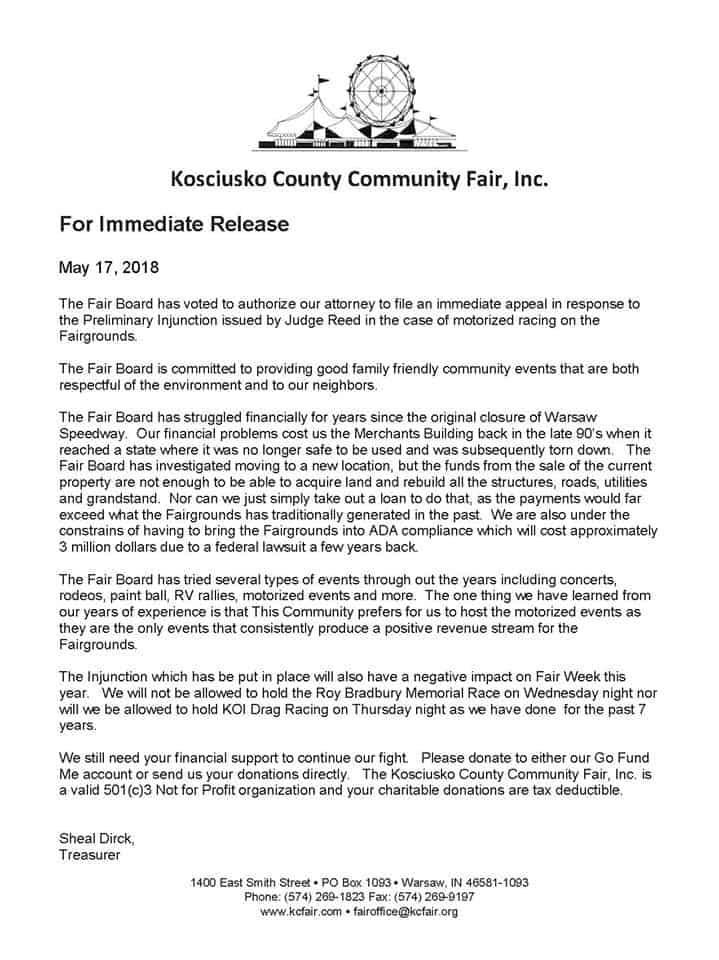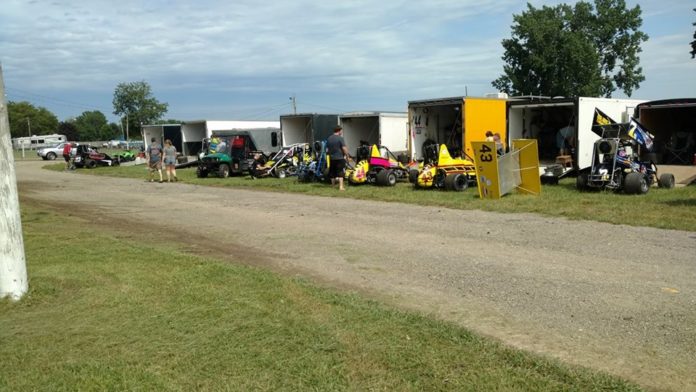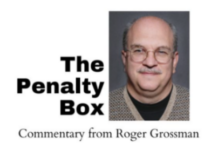Circuit Court Judge Michael Reed granted a preliminary injunction Wednesday against Kosciusko County Community Fair Inc. having motorized racing at the fairgrounds.
During the court proceedings, the Fair – the defendant in the case – is “prohibited from conducting, running, permitting or allowing motorized racing on fairgrounds property or otherwise violating the restrictive covenants” that were put into place in 1990.
The plaintiffs – four homeowners who sought an injunction against motorized racing – are required to post a $50,000 bond to cover costs in the event the defendants win the lawsuit.
The Fair filed a motion May 9 for all issues in the case to be determined by a jury trial. A ruling has not been made on that motion.
The hearing on the plaintiffs’ motion for a temporary restraining order and/or preliminary injunction was in Reed’s court May 10. Evidence and testimony were submitted by both sides.
RELATED: Kosciusko County Fair Board vows to fight to keep races going
Reed’s injunction order says the plaintiffs asked the court to enforce restrictive covenants dated July 18, 1990, between Kosciusko County Fair Association Inc., the predecessor to Kosciusko County Community Fair Inc., and nine homeowners.
Testifying for the homeowners May 10 was Chris Cummins, the son of James A. Cummins, one of the original homeowners involved in the 1990 covenants. Cummins now owns his father’s property on the lake.
The court found that the “restrictive covenants cleary and unambiguously mandate that the fairgrounds may not be used for motorized racing.”
The court found that Chris was a successor to his father in respect to the real estate James owned at the time of the covenants.
The injunction explains that restrictive covenants are a form of expressed contract between a grantor and a grantee. The general purpose of a restrictive covenant is to maintain or enhance the value of land, often times by controlling the nature and use of surrounding lands.
The court found the restrictive covenants meet all necessary requirements to be enforceable. The injunction states, “Cleary, the grantor intended (the covenants) would run with the land, the required (relationship between two parties recognized by law) … is present, at least as to plaintiff Chris Cummins, and the covenant touches and concerns the land as the covenants are logically connected to both the defendant’s and Cummins’ property, and they relate to the use and enjoyment of this real estate.”
When considering a request for preliminary injunction, a trial court must consider several factors, including whether the party has established a reasonable likelihood of success at trial; the party seeking the injunction has an adequate remedy at law; the injury to the party seeking the injunction outweighs the harm to the party who would be enjoined; and whether the granting of the injunction would disservice the public interest.
On the first factor, the court found the plaintiffs have established a reasonable likelihood of success on the merits. It said there is no legal remedy that will adequately compensate the plaintiffs for the noise and disruption to their use of their property, and that the plaintiffs’ use of their real estate – once precluded or compromised by the defendant – is gone forever.
As to whether the harm to the plaintiffs of denying the injunctive relief outweighs the harm to the defendant of granting the injunctive relief, the court found if the plaintiffs are denied relief they will be denied a benefit that they considered when they purchased their real estate, denied the benefit of their bargain and denied the use of their property. The harm to the defendant is that it will not be able to breach the restrictive covenants which it agreed to and for which it received a valuable consideration, that being the settlement of a lawsuit. The court found the harm to the plaintiffs outweighs that of the defendant.
As to whether the public interest would be disserved by granting the injunction, the court found this factor favors the homeowners. Indiana recognizes the freedom of parties to contract and granting the injunction will enforce the parties’ agreement, and granting the injunction to uphold the parties’ contract furthers public interest.
Secondly, the court said restrictive covenants are “clothed with a presumption of validity” because homeowners make decisions to purchase real estate based upon the existence of restrictive covenants. Failing to enforce a covenant deprives the homebuyers of the benefit of their bargain and diminishes property values.
Third, the covenants resulted from the settlement of litigation, and Indiana “strongly favors settlement agreements” to resolve disputes, the court found.
Finally, according to the court document, “the public interest will not be disserved by enjoining the motorized races, reducing noise pollution and maintaining the tranquility of the area and the lake.”
Since the injunction, the Fairgrounds released this statement:






